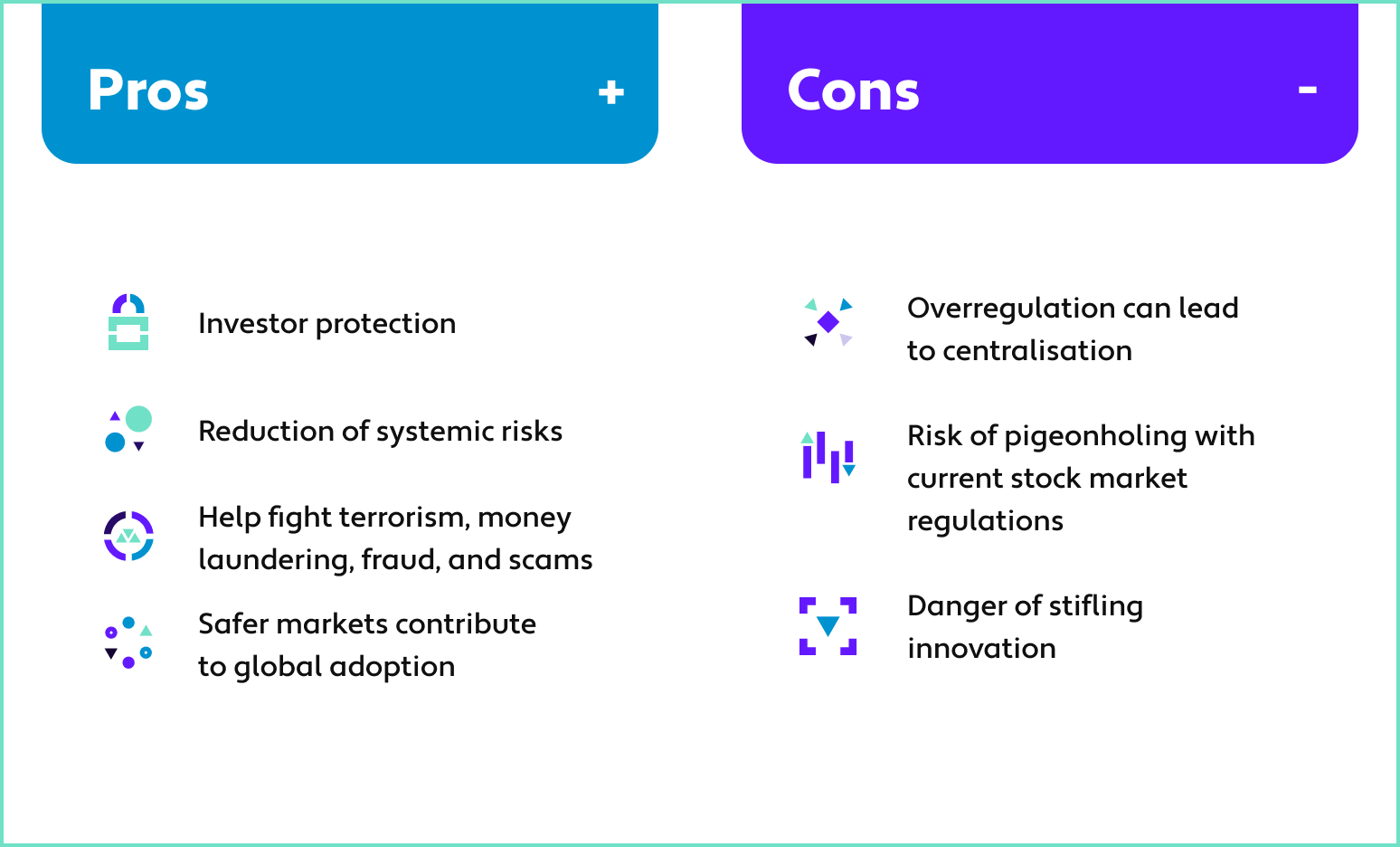Cryptocurrency Regulation: Pros and Cons

Calls for cryptocurrency regulation are getting louder by the minute following multiple implosions, within the industry.
The global cryptocurrency market cap lost over $1.3 trillion in the first eleven months of 2022 hurt by the collapse of layer-one blockchain Terra’s ecosystem and the bankruptcy of leading crypto exchange FTX.
The massive erosion of wealth has alarmed government authorities and regulators, prompting them to fast track the implementation of cryptocurrency regulation to safeguard investors and financial systems.
How is the crypto regulatory scene across the globe?
The field of cryptocurrency regulation is still in its infancy. Around the world, regulatory frameworks are currently being created and are in various stages.
In the US, the definition of cryptocurrencies was the hottest regulatory topic of the year. The US Securities and Exchange Commission (SEC) chairman Gary Gensler led the campaign to label “the majority of crypto tokens” as securities.
Meanwhile, crypto believers voiced their preference to be regulated by the Commodity Futures Trading Commission (CFTC), which would put cryptocurrencies in the same bracket as gold and silver. The “commodity” designation would relieve crypto-based firms from the strict reporting and disclosure rules administered by the SEC.
Across the Atlantic, the regulatory focus in Europe was on the energy-intensive nature of proof-of-work (PoW) cryptocurrencies like Bitcoin. In January 2022, EU officials tried to ban PoW mining across the whole region but failed.
In Asia, Japan prioritised regulations focused on customer protection and anti-money laundering. Meanwhile, China has maintained its 2021 ban on cryptocurrency trading and mining.
How can governments regulate cryptocurrency?
While purists see digital asset regulation as incompatible with the decentralisation roots of crypto, many have become more open to regulations in the hope that they will lead to safer markets for investors.
In recent years, the crypto industry has seen encouraging signs where governments have shown a willingness to understand the benefits of blockchain and cryptocurrency technology.
US President Joe Biden’s administration called for “responsible development of digital assets” in an executive order passed in March 2022. The US government said digital assets presented an opportunity to reinforce US leadership in the global financial system, expand affordable financial services to the underbanked, and reduce cross-border payment costs.
In Japan, where cryptocurrency regulations are among the most advanced in the world, a recently formed Japan Crypto Asset Exchange Association was given self-regulatory status by Japan’s financial system regulator, the Financial Services Agency (FSA) to monitor crypto trading businesses in the country.
“It’s a very fast-moving industry. It’s better for experts to make rules in a timely manner than bureaucrats ,” a senior FSA official told news agency Reuters.
Cryptocurrency Regulation: Pros and Cons
Let us now discuss the pros and cons of regulation on blockchain technology and cryptocurrencies.
Pros:
The lack of transparency and accountability within the cryptocurrency sector was put under the spotlight when industry leaders like FTX, Voyager, and Three Arrows Capital went bankrupt in 2022.
Regulations within the sector can help protect investors from losing their deposits and investments.
As of December 2022, the cryptocurrency sector has still not recovered from the collapse of the Terra ecosystem, which was valued among the top ten blockchain networks in the world in terms of market capitalisation.
Since the depegging of algorithmic stablecoin TerraUSD in early May 2022, the cryptocurrency market has lost over $800 million in valuation, and several crypto firms have collapsed in its aftermath.
Blockchain research firm Chainalysis reported cryptocurrency-based crime hit an all-time high in 2021, with $14bn lost to “rug pulls”, hacks, and ransomware attacks.
Cons:
Bitcoiners are drawn to the cryptocurrency mainly for its aspects of decentralisation. Bitcoin’s lack of dependence on intermediary governments and financial organisations is its biggest draw.
If future regulations restrict a blockchain’s ability to function autonomously, those blockchains and their native cryptocurrencies will lose investors and supporters.
3. Regulations in the nascent cryptocurrency industry can stifle innovation.
For example, the development of smart contracts at Ethereum helped numerous projects raise capital via initial coin offerings (ICOs) within a short period of time without regulatory or compliance constraints. The capital raised from ICOs has helped support the development of new innovations in the decentralised finance (DeFi), non-fungible token (NFT), stablecoin, gaming, and metaverse spaces.
Today, crypto ICOs are being scrutinised by the US SEC on the grounds that cryptocurrencies are securities, and any capital-raising event should be registered with and approved by the authority.

Concluding thoughts
Cryptocurrency regulation is inevitable. The cryptocurrency sector has grown to such a significant size - market cap of over $2.8 trillion at its peak in November 2021 - that authorities feel the need to implement rules and standards sooner rather than later.
Centralised crypto exchanges will be the first to be affected by any upcoming crypto regulations in 2023. Meanwhile, decentralised exchanges may see an increase in traffic if the regulations are overbearing and restrictive.
However, after several implosions within the sector, the need for crypto regulations feels desirable. What is most important is that policymakers become innovative and free-minded like the cryptocurrency sector to develop modern, fair, responsible, and crypto-friendly laws.
FAQ:
Can governments ban cryptocurrency?
There have been several instances of governments banning cryptocurrencies. China banned all cryptocurrency transactions and mining in 2021. Among the other nations that have outlawed cryptocurrencies are Egypt, Nepal, Bangladesh, and Iraq.




